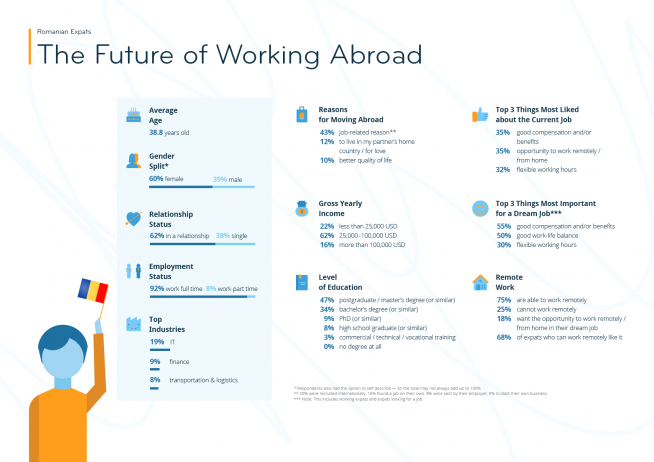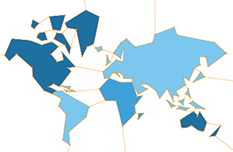Romanians Working Abroad Enjoy Working Remotely
Why do Romanians move abroad? According to the Expat Insider 2021 survey by InterNations, 43% of Romanians working abroad name their career as the most important reason for relocating to another country. This is a slightly lower share than the global average among working expats, 47% of whom moved abroad for job-related reasons.
Most Romanians working abroad were recruited internationally (20%), followed by 16% who found a job on their own, and 8% who were sent abroad by their employer. Not a single survey respondent from Romania moved abroad to start their own business.
Aside from work-related reasons, an above-average share of Romanian expats working abroad mainly moved to another country because they wanted to live in their partner’s home country / for love (12% vs. 10% globally) or because they were looking for a better quality of life (10% vs. 6% globally).
The Typical Romanian Expat Working Abroad Is Young, Female, and Works in IT
The typical Romanian expat working abroad differs quite a bit from the average working expat. First, they are only 38.8 years old, which is much younger than the average expat (43.1 years). In addition, three out of five Romanian expats working abroad (60%) are female, compared to just 46% globally. Close to two in five (39%) are male (vs. 53% globally), while up to 1% prefer to self-describe their gender identity. More than nine in ten Romanian expats (92%) work full time, ten percentage points more than the global average (82%).
The most common field that Romanian expats work in is IT (19% vs. 11% globally). Other common fields of work include finance (9%) and transportation & logistics (8%), as well as healthcare, manufacturing & engineering, and education (7% each). While the share of Romanian expats working in transportation & logistics is twice the global average (8% vs. 4% globally), they are underrepresented in the field of education, though (7% vs. 12% globally).
Romanian Expats Excel in Senior/Specialist Positions
While the demographics are quite unique, the level of education among Romanians working abroad is similar to the global average. In fact, the share of Romanians holding a postgraduate degree / master’s degree (or similar) is the same as the global average (47%). The shares are also similar for those who cite a bachelor’s as their highest academic degree (34% vs. 33% globally) and for those with a PhD (9% vs. 8% globally). A share of 8% only graduated high school, compared to 5% globally.
Despite education levels similar to the global average, Romanian expats excel in senior positions. Over two in five (44%) work in a senior or specialist position, which is 14 percentage points above the global average (30%). However, just 8% are top managers / executives (vs. 13% globally). Another 20% work in lower or middle management (vs. 17% globally).
Entrepreneurship seems to be uncommon for working Romanians abroad: only 2% have their own business (vs. 7% globally), while 8% are self-employed / freelancers (vs. 11% globally).
Low Job Satisfaction, High Levels of Happiness with Local Economy
Overall, Romanian expats are not so happy with their working life: just 66% are satisfied with their job in general (vs. 73% globally), while 17% rate this factor negatively (vs. 13% globally). Actually, 7% even say that they are not satisfied with their job at all, compared to just 3% globally.
A closer look at the individual factors shows that Romanians working abroad are mainly unhappy with their work-life balance. Just 62% are happy with this factor (vs. 68% globally), while 20% are unhappy (vs. 16% globally). What is more, they only report average or slightly higher-than-average satisfaction with their career opportunities (50% vs. 49% globally), their working hours (71% vs. 70% globally), and their job security (70% vs. 67% globally).
However, close to three-quarters (74%) rate the state of the local economy in their host country positively — globally just 65% say this about their current country of residence. This is hardly a surprise, considering that the two most common destinations Romanian expats work in are Germany and the Netherlands. Both countries are voted among the top 10 worldwide for the state of their local economy in the Working Abroad Index of the Expat Insider 2021 survey.
The third most common destination, the UK, does not perform so well in this regard. However, landing in 35th place out of 59 countries, it still ranks far ahead of Romania, which ends up among the bottom 10 worldwide (52nd).
Romanian Expats Enjoy Working Remotely and Good Salaries
When describing what they like best about their current jobs, over one in three (35.2%) cite the opportunity to work remotely / from home (vs. 32% globally). In fact, three in four (75%) are currently able to work from home, and 68% report that they enjoy it. Only 11% say that they are able to work remotely but usually prefer not to, compared to 16% globally. However, when asked about their dream job, the opportunity to work remotely / from home is not that important to Romanian expats: just 18% cite it among the most relevant factors for an ideal work environment (vs. 22% globally).
The gap between the most and the second most frequently mentioned aspect is less than a percentage point: 34.6% of Romanian expats cite a good compensation and/or good benefits as a highlight of their current job. In fact, 71% have a gross yearly income of up to 75,000 USD (vs. 62% globally), and 16% make more than 100,000 USD per year (vs. 23% globally).
The Dream Job Wish List for Romanian Expats
When envisioning their future dream job, a good compensation and/or benefits is most important to Romanian expats (55%). This is followed by a good work-life balance (50%), flexible working hours and general career development (30% each), as well as room for personal development / growth (28%) and creative/interesting tasks (25%).
“Currently, Romanian expats might not be able to find these kinds of jobs in their most common destinations,” says InterNations Founder and Co-CEO Malte Zeeck. “However, they are currently also unlikely to find them back home.”
In fact, just 56% of Romanians working abroad say that factors like autonomy, freedom, creativity, personal development, and self-fulfillment are important in the business culture of their current country of residence. These values are closely related to the concept of New Work, which describes the new way of working in the global and digital age. On a global scale, 58% say that this concept and associated values play an important role in their host country.
However, 53% of Romanian expats also say that these aspects are at least more important than in Romania. In fact, the three most common destinations where Romanian expats work do rank ahead of Romania when it comes to expats comparing the importance of New Work in the local business culture. The Netherlands ranks best (5th out of 55 countries), followed by the UK (15th) and Germany (35th), while Romania lands in 43rd place.




